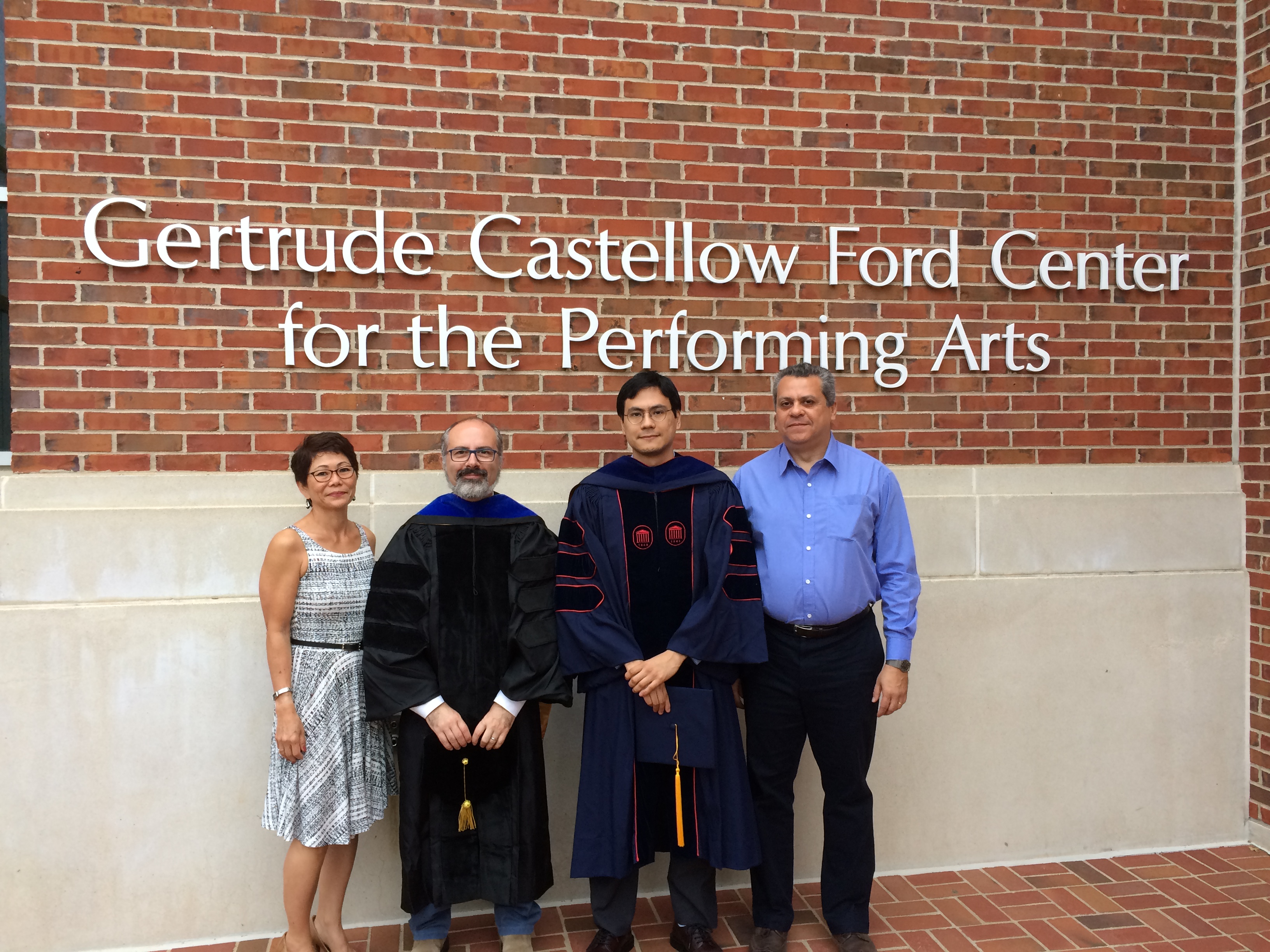Sunday, May 14, 2017
Hector Okada da Silva has a PhD! Hector’s dissertation (Compact Objects in Relativistic Theories of Gravity) can be downloaded here. Hector will work with Thomas Sotiriou this coming summer, and then move to Montana State University for a postdoc with Nico Yunes.

Thursday, May 11, 2017
Emanuele’s group received a new grant (NSF AST-1716715) from the NSF Division of Astronomical Sciences.
The award (Understanding Compact Binary Star Formation with the First Gravitational Wave Detections) has a starting date of July 1, 2017. It will support Collaborative Research with Professor Bangalore Sathyaprakash (Penn State and Cardiff).
This is the abstract (from the NSF webpage):
The first detection of gravitational waves (GW) by the LIGO observatory was from the collision of two black holes (BH), which are considered a type of compact binary stars. This has opened up a new window in astronomy, enabling a deeper understanding of the physics of relativity through the study of merging BHs, the objects that bend space and time the most. Since these interactions are so complicated, powerful computer simulations are needed to interpret the science. A collaboration between research groups at the University of Mississippi and Pennsylvania State University will develop and run computer models to better understand the formation and development of compact binary star systems and to more effectively use the rich information from gravitational waves to probe these systems. A related effort is the development of methods to use GW in the future to study dark matter. The research team will also promote scientific literacy by providing astronomy lectures, demonstrations, and hands-on activities to school children and adult citizenry in economically disadvantaged communities in the state of Mississippi and the commonwealth of Pennsylvania.
The investigators will carry out two closely related projects to model the gravitational wave astrophysics of compact binary systems. The first project concerns the astrophysical information that can be extracted from the characteristic signature imposed on a gravitational wave signal due to the spin and the orbital precession of coalescing black hole binaries. The team will introduce spin dynamics into compact binary evolution models and track the evolution of BH binaries from formation through merger, including effects such as an initial supernova kick, mass transfer and spin-orbit coupling. An offshoot of this work is to investigate bounds on ultra-light bosonic dark matter though its possible GW signature. The second project will involve inferring compact binary population models from a catalog of gravitational wave observations. The team will put together a database of evolutionary models and work to distinguish between the predicted observables of the various models. Goals include understanding the distribution of BH masses, spins, and merger rates and the properties of the stochastic GW background. The principal investigators will mentor a graduate student and postdoctoral researcher and plan to organize two workshops on strong gravity and binary dynamics and to lecture at international graduate schools on work related to the proposal.
Friday, February 17, 2017
Our group will have several visitors this Spring. Most of them are coming with funding from the Strong Gravity and High Energy Physics Marie Sklodowska-Curie Research and Innovation Staff Exchange (RISE) Action, funded by the EU Horizon 2020 program H2020-MSCA-RISE-2015.
These visitors will take part in the StronG BaD (Strong Gravity and Binary Dynamics) workshop that we are organizing (see the announcement in Ole Miss News).
Here is the list of visitors and their arrival/departure dates:
Leonardo Gualtieri (Rome), Feb 16-Mar 1
Laura Bernard (IST Lisbon), Feb 20-Mar 20
Seth Hopper (IST Lisbon), Feb 20-Mar 20
Andrea Nerozzi (IST Lisbon), Feb 20-Mar 20
Michalis Agathos (Cambridge), Feb 21-Mar 21
William Cook (Cambridge), Feb 21-Mar 21
Christopher Moore (Cambridge), Feb 21-Mar 21
Roxana Rosca (Cambridge), Feb 21-Mar 21
Atsushi Nishizawa (Nagoya), Feb 23-Mar 3
Pedro Cunha (Aveiro), Feb 25-Mar 24
Carlos Herdeiro (Aveiro), Feb 25-Mar 11
Antoine Klein (Paris), Feb 26-Mar 15
Wednesday, February 1, 2017
Hi,
A few of us were at the APS meeting in Washington D.C. this week. It was a very good meeting, lots of astronomy, gravity, black holes and gravitational waves! On Tuesday afternoon, after the last session I finally had a couple of hours to do a little sightseeing. I have been many times in D.C., but never I had a chance of visiting the Jefferson memorial. Inside the dome, four panels show quotations from Thomas Jefferson. One of these panels, in particular, includes a quotation that I believe is worth remembering these days: “No man […] shall otherwise suffer on account of his religious opinions or belief”
Marco
Tuesday, January 17, 2017
On January 13, in response to the call of the European Space Agency (ESA) for L3 mission concepts, the LISA Mission consortium submitted the proposal for the Laser Interferometer Space Antenna (LISA).
A copy of the proposal is freely available for download here, and it was also posted to the arXiv. You can show your support for the LISA mission by signing up on this website.
